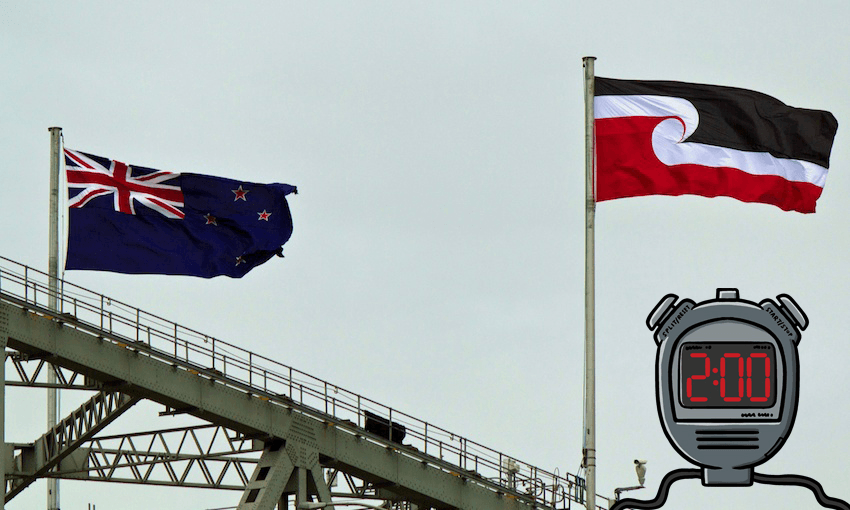Voting is under way in the New Zealand general election. Explore the main parties’ pledges at Policy.nz, but here’s a whistlestop tour of what parties are promising on issues that affect Māori.
Read more two-minute policy wraps here
Te ao Māori is a fairly uneven policy area – the Māori Party lists more than 80 separate policies, in contrast to NZ First who, for example, lists just one. Note: some policy areas such as health and education also have outcomes for Māori that aren’t specifically addressed.
Te Tiriti and governance
The Māori Party have proposed some major constitutional changes, including establishing a separate Māori parliament. An autonomous Māori parliament, Kotahitanga, existed from 1892 until 1902. The Māori party would also register all Māori to the Māori electoral roll (and ensure Māori can switch between the Māori and general roll at any time), entrench the Māori electoral seats, reduce party vote threshold to 2.5%, end “full and final” settlements and “large natural groupings”, and make Waitangi Tribunal Recommendations binding. They also plan to insert relativity clauses into all Treaty settlements to ensure all iwi have parity with Ngāi Tahu and Tainui.
The Māori Party and the Greens would both require a Crown response to Matike Mai Aotearoa – the 2018 report on how to develop and implement a model for an inclusive constitution based on tikanga and kawa, He Whakaputanga o te Rangatiratanga o Niu Tireni and Te Tiriti o Waitangi, with the Greens hoping to transform the constitution by 2040.
The Greens would also entrench the Māori seats and implement the UN Declaration on the Rights of Indigenous Peoples.
Labour and National list no policies on governance or Treaty issues. Under former Minister for Treaty Negotiations, Chris Finlayson, the National government settled 59 Treaty claims over three terms, the highest rate of any government. The current minister, Andrew Little, is progressing the complicated Ngāpuhi and Whakatōhea settlements.
Land and resources
Customary rights are a big-ticket issue for the Māori Party, including freshwater, energy, cleantech and climate change arrangements. They also want to return all conservation land to iwi, including camping grounds. The Green Party would also uphold the customary rights of iwi and hapū over water and require commercial water users to pay a fee.
Both Act and NZ First want to prevent the government from buying the contested land at Ihumātao, and the New Conservatives would remove consultation with iwi from the RMA and abolish all Māori customary interests and co-governance arrangements.
The Opportunities Party (TOP) would look to fund mana whenua to understand water health from a Māori perspective.
Te reo Māori and education
This year’s budget saw the Labour government increase funding to Te Kōhanga Reo (te reo Māori-medium early childhood centres), to $196 million over four years. They want to integrate te reo Māori into all schools and ECE by 2025. National want to continue to support the development of resources for the New Zealand history curriculum and would continue to support Māori-medium education.
Neither of the major parties would make te reo Māori compulsory in schools, however, the Greens and the Māori Party would make it a core curriculum subject up to year 10 and TOP would make it compulsory in all schools.
The Māori party would also require all primary schools to incorporate te reo Māori into 25% of their curriculum by 2026 and 50% by 2030.
Justice
While few justice policies are targeted toward Māori specifically, Māori are grossly over-represented by most crime and justice metrics. National want to create a dedicated gang unit, establish best practise for meth support and expand the collaborative family violence programme. Its plans on using victim-centred social investment to reduce crime, rather than focusing on reducing the prison population.
Labour wants to reduce the prison population and further increase funding for family violence services, including a boost for kaupapa Māori services.
The Greens oppose further arming of police and require officers to undergo de-escalation training. They would also increase funding for legal aid and community law centres.
Housing
The Māori Party want to build 2,000 houses on ancestral Māori land and remove legal barriers to building papakāinga. Labour has also tried to remove some of these through their Whenua Māori Programme and changes to the Te Ture Whenua Māori Act.
The Māori Party will also require a quarter of funding for environmentally-friendly housing go to Māori-led housing projects, introduce a capital gains tax on properties other than the family home and a tax on vacant houses which they say will free up over 50,000 homes.
The Green Party would facilitate finance for development of papakāinga on Māori land and ensure relevant central and local government planning documents enable papakāinga development.
Labour says it will “continue” to build on the work already undertaken to build more papakāinga and to improve Māori home ownership rates through programmes like its progressive home ownership scheme.
Explore the parties’ pledges in more depth at Policy. The essential campaign dates are here. For all you need to know about the cannabis referendum click here. For the assisted dying referendum click here.

